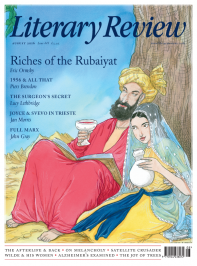Matthew Sturgis
An Ideal Husband?
Wilde’s Women: How Oscar Wilde Was Shaped by the Women He Knew
By Eleanor Fitzsimons
Duckworth Overlook 372pp £20
The Fall of the House of Wilde: Oscar Wilde and His Family
By Emer O’Sullivan
Bloomsbury 495pp £25
Oscar Wilde is now acknowledged as one of the giants of the 19th century. It was, of course, a century of giants, both intellectual and artistic: great men – and women – who faced the challenges of a world changing under the pressures of scientific discovery, industrial advance, imperial expansion and religious doubt, and came up with any number of interesting responses. Wilde, however, is one of the rare giants who seems to grow in stature with each passing year. Thomas Carlyle, Herbert Spencer, Matthew Arnold and Walter Pater dwindle with the decades. Wilde increases steadily in reputation, relevance and reach.
It is a remarkable development, aided perhaps by the fact that the story of his life follows the compelling arc of a Greek tragedy or a television box set. It is helped too by the assorted elements of that tragedy. Wilde’s youthful fame – before he had written barely a word – marks him out for modern audiences as an early manipulator of what we would now call celebrity culture; his fall at the hands of the Victorian ‘establishment’, on account of his sexual relations with young men, has made him not just a gay icon but a hero to contrarians of every stripe. And then there is the undimmed glory of his language: his delicious epigrams are quoted on a thousand T-shirts, signboards, fridge magnets and Twitter feeds; his plays are regularly staged and screened; his books are still actually read.
Wilde has become so big that he has grown daunting to the would-be biographer: the last full-scale biography of him remains Richard Ellmann’s, published in 1987. To escape this problem there has been, in recent years, a succession of interesting biographical studies, each one focusing on a single facet of

Sign Up to our newsletter
Receive free articles, highlights from the archive, news, details of prizes, and much more.@Lit_Review
Follow Literary Review on Twitter
Twitter Feed
It wasn’t until 1825 that Pepys’s diary became available for the first time. How it was eventually decrypted and published is a story of subterfuge and duplicity.
Kate Loveman tells the tale.
Kate Loveman - Publishing Pepys
Kate Loveman: Publishing Pepys
literaryreview.co.uk
Arthur Christopher Benson was a pillar of the Edwardian establishment. He was supremely well connected. As his newly published diaries reveal, he was also riotously indiscreet.
Piers Brendon compares Benson’s journals to others from the 20th century.
Piers Brendon - Land of Dopes & Tories
Piers Brendon: Land of Dopes & Tories - The Benson Diaries: Selections from the Diary of Arthur Christopher Benson by Eamon Duffy & Ronald Hyam (edd)
literaryreview.co.uk
Of the siblings Gwen and Augustus John, it is Augustus who has commanded most attention from collectors and connoisseurs.
Was he really the finer artist, asks Tanya Harrod, or is it time Gwen emerged from her brother’s shadow?
Tanya Harrod - Cut from the Same Canvas
Tanya Harrod: Cut from the Same Canvas - Artists, Siblings, Visionaries: The Lives and Loves of Gwen and Augustus John by Judith Mackrell
literaryreview.co.uk